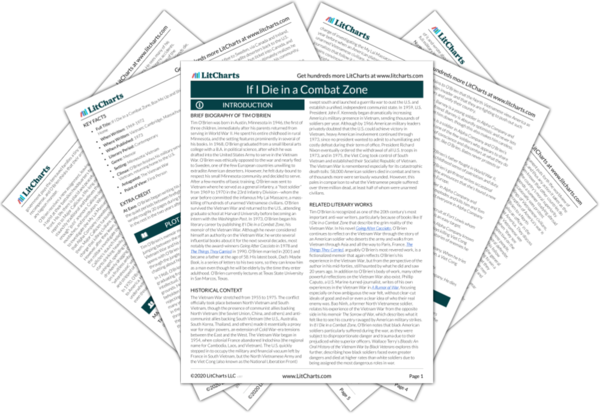Summary
Analysis
In 1968, home from college after graduation, O’Brien receives a draft notice that inducts him into the Vietnam War. He keeps it tucked in his billfold and spends the summer drinking coffee and beer, playing golf, and debating the ethics of war with his hometown friends. College friends visit and ask what O’Brien will do, but he doesn’t know yet. All of their debates about war and ethics feel futile when the “smiling” people at the draft board are asking O’Brien to serve his country.
O’Brien’s complex discussion on ethics contrasts with the “smiling” people at the draft board expecting him to serve. This contrast reflects the story’s thematic conflict between conscience, which tells O’Brien not to fight in an evil war, and duty, which encourages him to serve his country regardless of what he feels.
Themes
O’Brien considers running away, partly because he is scared but mainly because he believes the war is wrong and causes so much death that it is evil. He has his doubts about whether he is right, especially since his town and family believe in patriotic service. Their influence eventually outweighs O’Brien’s moral objections, and he feels that “gravity” rather than “reason” leads him to accept his draft notice. All summer, his family avoids the subject of the war. O’Brien reflects that he’s lived in this town until now, benefited from its care. Just as Socrates chose to accept his execution, so O’Brien should accept his military service. If he really wanted to move to Canada, O’Brien thinks, he could have done it before being drafted.
O’Brien lets his sense of duty to his family and community outweigh his conscience. However, his feeling that “gravity” draws him into military service suggests that serving is not his active choice, just the default of letting himself be pulled along. This suggests that for some soldiers, duty is something they feel passively, driving them toward a decision they might never actively make on their own. In this sense, duty is arguably a negative force since it pushes people to defy their conscience.
Themes
At the end of the summer, the time comes for O’Brien to join the army. His family has “a cautious sort of Last Supper together” and prepares for him to leave, until his father looks at his draft papers and realizes O’Brien is not supposed to report in until tomorrow—he’d read the notice wrong. They breath a sigh of relief and O’Brien takes a long drive around the lake next to town. He feels like his sense of self and the war are permanently “grafted together,” unable to exist without each other, and it makes him angry. At night, in his family’s basement, O’Brien writes out his opposition to the war on pieces of cardboard, declaring the war and the draft board are evil, and even the town is evil for accepting that the war must be fought.
O’Brien and his family’s “Last Supper” is a reference to the last meal that Jesus Christ has with his friends before he is crucified. O’Brien makes several such allusions to Christ’s crucifixion throughout the story, which reflects his perception of his relationship to the war. This allusion does not suggest that O’Brien is any sort of messianic figure, but rather that he is being sacrificed as a martyr for a larger cause, just as Christianity teaches that God sacrificed Jesus Christ to save humanity. O’Brien’s declaration that the town is evil for passively accepting a misguided war suggests that all Americans, by accepting the actions of their government, participate in the evils that the country commits.
Themes
O’Brien tries to read his declarations aloud but instead he tears up the signs and throws them away, feeling like a coward. O’Brien reflects that he’s never been one to take a stand—he’s always been a listener instead. He thinks about his friends’ and neighbors’ theoretical arguments about war but he figures that all of these ideas matter less when the war in question seems wrong in and of itself.
Although critics sometimes label O’Brien an anti-war writer, his statement that the Vietnam War in particular is wrong suggests that he does not oppose all wars—only ones that are fought for the wrong reasons.
Themes
Get the entire If I Die in a Combat Zone LitChart as a printable PDF.

On August 13, O’Brien boards a bus that takes him to basic training. The next day, he and all the other new recruits raise their hands in the air and swear their induction oath. O’Brien never been a fighter; he’s a “confirmed liberal,” though not an outright pacifist. Nevertheless, he thinks the Vietnam War should end, though his moral convictions don’t have the energy to stand against the weight of his community’s expectations. O’Brien fears the exile that would result from refusing to fight, and after the war is over he still feels that conflict. He wishes his book could carry succinct moral lessons, a warning to future generations, but all he has are his experiences. As a foot soldier, all he can do is “tell war stories.”
O’Brien’s feeling that his moral convictions don’t have the strength to stand against his community’s expectations suggests that duty, though largely passive, is still a powerful and even crushing force. O’Brien’s fear of exile indicates that his desire to belong to the world he grew up in outweighs his desire to avoid fighting. His eventual feeling that he has no morals to preach, only stories to share, suggests that even years later, his experiences feel chaotic and inexplicable.
Themes












